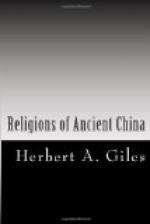The tortoise and the grass have long since disappeared as instruments of divination, which is now carried on by means of lots drawn from a vase, with answers attached; by planchette; and by the chiao. The last consists of two pieces of wood, anciently of stone, in the shape of the two halves of a kidney bean. These are thrown into the air before the altar in a temple,—Buddhist or Taoist, it matters nothing,—with the following results. Two convex sides uppermost mean a response indifferently good; two flat sides mean negative and bad; one convex and one flat side mean that the prayer will be granted. This form of divination, though widely practised at the present day, is by no means of recent date. It was common in the Ch’u State, which was destroyed B.C. 300, after four hundred and twenty years of existence.
CHAPTER II — CONFUCIANISM
Attitude of Confucius.—Under the influence of Confucius, B.C. 551-479, the old order of things began to undergo a change. The Sage’s attitude of mind towards religion was one of a benevolent agnosticism, as summed up in his famous utterance, “Respect the spirits, but keep them at a distance.” That he fully recognised the existence of a spirit world, though admitting that he knew nothing about it, is manifest from the following remarks of his:—
“How abundantly do spiritual beings display the powers that belong to them! We look for, but do not see them; we listen for, but do not hear them; yet they enter into all things, and there is nothing without them. They cause all the people in the empire to fast and purify themselves, and array themselves in their richest dresses, in order to attend at their sacrifices. Then, like overflowing water, they seem to be over the heads, and on the right and left, of their worshippers.”
He believed that he himself was, at any rate to some extent, a prophet of God, as witness his remarks when in danger from the people of K’uang:—
“After the death of King Wen, was not wisdom lodged in me? If God were to destroy this wisdom, future generations could not possess it. So long as God does not destroy this wisdom, what can the people of K’uang do to me?”
Again, when Confucius cried, “Alas! there is no one that knows me,” and a disciple asked what was meant, he replied, “I do not murmur against God. I do not mumble against man. My studies lie low, and my penetration lies high. But there is God; He knows me.”
We know that Confucius fasted, and we know that “he sacrificed to the spirits as though the spirits were present;” it is even stated that “when a friend sent him a present, though it might be a carriage and horses, unless it were flesh which had been used in sacrifice, he did not bow.” He declared that for a person in mourning food and music were without flavour and charm; and whenever he saw anyone approaching who was in mourning dress, even though




